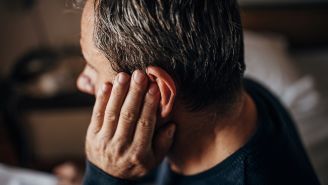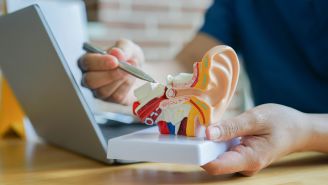We all know someone who displays the classic signs of difficulty hearing: They run the television with its volume blaring or maintain the conviction that all their conversational partners are mumbling.
Alas, hearing loss is all too common.
In fact, the Centers for Disease Control and Prevention (CDC) reports that hearing loss is the United States’ third most common chronic physical health condition.
But just because it’s prevalent doesn’t mean it’s inevitable. Find out why hearing loss happens, along with the best tactics to help reduce your risk.
What causes hearing loss?
“Aging and noise exposure are two of the most common causes of hearing loss,” says Jamie Soper, AuD, of MercyOne Waterloo Medical Center in Waterloo, Iowa. What’s more, says Soper, almost half of all Americans over age 75 experience the issue. (Other factors that can lead to hearing loss include genetics, excessive ear wax, certain medications, illnesses, and lesions on the hearing nerve.)
Why are loud noises so problematic when it comes to hearing?
Inside your cochlea—or inner ear—are tiny hair cells that detect sound waves and transmit them to your brain. With exposure to loud noise, these cells can be damaged or die. The problem is they cannot grow back. As the number of functioning hair cells decreases, hearing is impeded. Forty million adults in the U.S. between the ages of 20 and 69 have noise-induced hearing loss, according to the CDC.
Protect your ears
While you can’t change your genetics or the fact of getting older, you can take steps to limit your exposure to the kinds of noises that may cause irreparable harm to your hearing. (Listen up, concertgoers and construction workers.)
First, keep noises as low as possible. Stop bumping up the volume on the television or radio. “Keep recreational music to a reasonable volume,” advises Soper. The CDC offers a good rule of thumb: If shouting is necessary for someone nearby to hear you over the noise, your environment is too loud.
Second, wear protection. Earmuffs or earplugs can help dampen loud noises. “Wearing hearing protection while in a loud environment can protect your ears from damage due to noise,” says Soper.
Plan ahead and take precautions when attending sporting events or firework displays and before you turn on the leaf blower or other noisy machinery or power tools. If you find yourself at a loud event without hearing protection, place yourself as far from the speakers as possible.
Consider your heart health
Yes, that’s right, cardiovascular health plays a role in your hearing.
“Your ears are very vascular, which makes them sensitive to changes in blood flow,” Soper explains. “People who are in good cardiovascular health have a lower risk of hearing loss.”
A 2018 study drawing on data from the Nurses’ Health Study II found a connection between a healthy diet and reduced hearing loss. To Soper, this points to the importance of healthy behaviors for maintaining good hearing.
“People who eat healthy tend to have good cardiovascular health and to take care of their bodies,” she says. “In turn, they take care of their hearing.”
Maintain your heart health by sticking to a well-balanced eating plan, such as the Mediterranean-style diet, that includes plenty of fruits and vegetables, whole grains, and foods rich in omega-3 fatty acids and lean proteins. Limit foods with lots of added sugars, trans and saturated fats, and sodium.
Regular exercise is important, too: Strive for at least 150 minutes each week of moderate-intensity physical activity like walking or yoga, or 75 minutes of vigorous-intensity activity like running or swimming. Always discuss any new exercise program with your healthcare provider.
Get evaluated
If you are concerned about your hearing, the single best thing you can do is visit a licensed audiologist, says Soper. “They can give you a thorough audiologic evaluation, review your results and provide helpful options for follow-up care.”
Keep your age in mind, too. “I strongly believe that anyone over the age of 65 should get a hearing evaluation by a licensed audiologist,” Soper adds. It’s important to do so even if you think your hearing is perfect, since an initial evaluation can establish a baseline, she points out.
How may hearing loss be managed?
There are a few ways to manage hearing loss. While there are high-tech options, Soper says simple communication adjustments—such as eliminating background noises and standing near conversational partners and looking directly at them—can be helpful for people with mild hearing loss.
Hearing aids, which make sounds louder, can help some people with hearing loss, as well. It’s worth remembering, though, that while hearing aids can amplify sounds around you, they don’t restore one’s hearing back to “normal.”
Trying them out is low-risk, points out Soper, so long as you do some research first. That's because many states—and many hearing aid manufacturers and audiologists—have trial periods of 30-days or longer. Check your state's regulations and/or the terms set by the manufacturer or your audiologist. If a hearing aid isn't helpful for you, you can return it, though some states require you to pay a small fee or cover shipping and handling.
For severe hearing loss, if hearing aids do not help, cochlear implants are an option for some people. These are electronic devices that stimulate your hearing nerves using electrical impulses. They may improve hearing for some people, but as with hearing aids, the resulting sound is not the same as natural hearing.
A patient with mild hearing loss might also ask their audiologist if over-the-counter personal sound amplification products (PSAPs)—devices that can help strengthen certain sounds—would be helpful.
The bottom line
Some types of hearing loss, such as those that have a genetic underpinning or are related to illness or aging, cannot be prevented or arrested. For others, a few sensible, healthy adjustments may help preserve your hearing.
“As long as people take care of themselves from a cardiovascular health standpoint and protect their ears from noise exposure, they can help keep their hearing protected,” says Soper.






